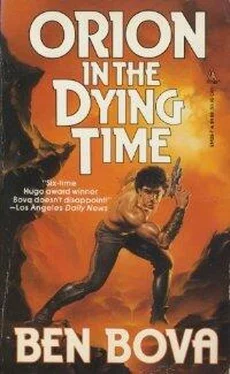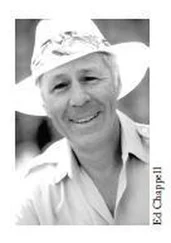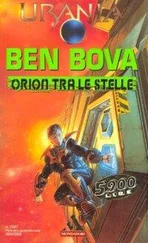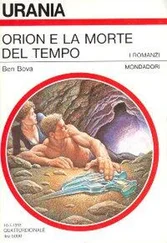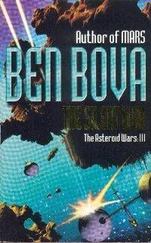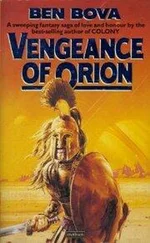Ben Bova - Orion in the Dying Time
Здесь есть возможность читать онлайн «Ben Bova - Orion in the Dying Time» весь текст электронной книги совершенно бесплатно (целиком полную версию без сокращений). В некоторых случаях можно слушать аудио, скачать через торрент в формате fb2 и присутствует краткое содержание. Год выпуска: 1990, ISBN: 1990, Издательство: Tor Books, Жанр: Фантастика и фэнтези, на английском языке. Описание произведения, (предисловие) а так же отзывы посетителей доступны на портале библиотеки ЛибКат.
- Название:Orion in the Dying Time
- Автор:
- Издательство:Tor Books
- Жанр:
- Год:1990
- ISBN:0-312-93111-5
- Рейтинг книги:4 / 5. Голосов: 1
-
Избранное:Добавить в избранное
- Отзывы:
-
Ваша оценка:
- 80
- 1
- 2
- 3
- 4
- 5
Orion in the Dying Time: краткое содержание, описание и аннотация
Предлагаем к чтению аннотацию, описание, краткое содержание или предисловие (зависит от того, что написал сам автор книги «Orion in the Dying Time»). Если вы не нашли необходимую информацию о книге — напишите в комментариях, мы постараемся отыскать её.
Orion in the Dying Time — читать онлайн бесплатно полную книгу (весь текст) целиком
Ниже представлен текст книги, разбитый по страницам. Система сохранения места последней прочитанной страницы, позволяет с удобством читать онлайн бесплатно книгу «Orion in the Dying Time», без необходимости каждый раз заново искать на чём Вы остановились. Поставьте закладку, и сможете в любой момент перейти на страницу, на которой закончили чтение.
Интервал:
Закладка:
We traveled from city to city in a procession, with Set at its head flanked by two of his people on their own mounts. I rode behind Set, and trailing me came a dozen more riders and pack animals carrying food and water for our journey. Each trip took nearly a week, as near as I could calculate in the murky, dust-filled air. For the planet kept its face always turned to its star, Sheol, and all the cities of this world were on the daylit side of Shaydan.
Every moment of that endless day the remorseless grit-laden wind flayed my flesh, half-blinded my squinting reddened eyes. Set and his people had scales to protect their flesh and transparent lids to cover their eyes; he pointed this out to me as another proof of reptilian superiority over mammals. I had neither the strength nor the will to argue.
There was no magnificent panoply, no gorgeous robes and billowing silks, no gleaming gold or silver among his entourage. The reptilians wore nothing except their scaly hides: Set deep carmine, his minions lighter shades of red. Our mounts were dusty dull tones of brown. I still dressed in my ancient leather kilt and vest; I had nothing else.
Water was not abundant on Shaydan. It was a desert world, with meager streams and rare lakes. Nothing as large as a sea or an ocean. The food they gave me to eat consisted of raw leafy vegetables and occasional chunks of meat.
“We keep herds of meat animals,” Set replied to my unspoken question. “We harvest them carefully and keep their numbers in balance with the environment. When the time comes to slay them, we put them to sleep mentally and then stop their hearts.”
“Very humane,” I said, wondering if he would understand my wordplay. If he did he gave no indication of it.
The cities we entered were not walled. From the weathered looks of their sturdy, domelike buildings, the cities were very old. Even in the wind-whipped dusty atmosphere of this hellish world it must have taken millennia to wear down such solid stone structures to the smooth rounded shapes they now presented. I saw no new buildings at all; everything seemed to be of the same age, and extremely ancient.
No blaring trumpets announced our approach to a new city, and no noble retinue came out to greet us. Still, crowds gathered at each city as we approached, lining the road to the city and the streets within it to bow solemnly as we passed and then stare wordlessly at us. More throngs clustered in the main city square where we invariably were met by the local leaders.
All in total silence. It was eerie. The people of Shaydan neither spoke nor made noise of any kind. No applause, not even the snapping of fingers or the clicking of claws. They would watch in complete silence as we stopped in the main square and dismounted. Sometimes a reptilian would point at me. Once or twice I thought I heard a hiss—laughter? Otherwise it was in total silence that we would be led into the largest building on the square. No sound at all except the eternal keening of the stinging wind. In silence a quartet of guards would march behind me as I stumbled, drag-footed and exhausted, behind Set and the city officials who would come out to greet him.
All of these people, Set’s entourage and the people of each city, looked to me like smaller copies of Set himself. Squinting in the gloomy dusty haze that passed for broad daylight among them, I began to notice minor variations from one city to another. Their scales were lime green here, shades of violet there. I even saw a whole city full of reptilians whose scales were patterned almost like a highlander’s tartan.
In each city, however, all the people were the same color. It was as if they all wore the same uniform, except that this coloration was the natural pigment of their scales. There were some variations in tone; the smaller a reptilian, the lighter the tone of its coloring, I found. Were size and color indicators of an individual’s age? I wondered. Or did they show an individual’s rank?
I received no answer from Set to my unspoken questions.
Regardless of the local color, in every city, once we dismounted, we were led into the largest building on the main square. The rounded domes of the city structures were only a small part of their true extent. Most of the cities were underground, their buildings interconnected by broad tunnels and buried arcades.
We were always brought to a large oblong room where a reptilian of Set’s own size sat on a raised dais at the far end. Obviously the local patriarch. The audience chamber would then be filled with smaller citizens of the city, lighter in color, lesser in rank. So I supposed.
Set would stand before the patriarch with me at his side, feeling puny and tired in the heavy gravity. More than once I slumped to the floor, Set would ignore it and allow me to lie there, and I felt grateful for the chance to rest. To Set, of course, it was a perfect exhibition of the weakness of the native life-forms on Earth, an obvious proof that his plan was achievable.
The chambers were as dimly lit as every other room I had been in; artificial light so deeply into the red end of the spectrum that it seemed to radiate darkness. And the heat. These reptilians basked in heat that made me almost giddy despite my efforts to keep my internal temperature under control.
Now and then Set would allow me to see the chamber through the eyes of one of his entourage. I waited eagerly for such moments. Then I would see a splendid audience hall, its majestic walls ablaze with mosaics showing the ancient history and lineage of the patriarch sitting before us. And while my borrowed vision drank in the scene all around me, I busily delved into the mind of my temporary host, trying to learn as much as I could without alarming either him or his master, Set.
Sometimes our audience took only a few minutes. More often Set stood before the patriarch’s dais for hours on end, silently conversing, hardly moving a muscle or twitching his tail. I knew he was exhibiting me as proof that the people of Shaydan could emigrate to Earth with impunity. I did not find out, however, what success he was meeting with. Did the brief interviews indicate quick agreement or adamant refusal? Did the long hours of mute discourse mean that Set and his host were arguing bitterly or that they were happily discussing every detail of the plan to colonize Earth?
Gradually, as we trekked from city to city across the broad desiccated face of Shaydan, as I was granted glimpses into the minds of Set’s followers, I began to piece together a rudimentary understanding of these people and their civilization.
Despite my physical weakness my mind was still active. In fact, I had little else to do except try to fathom as much as I could glean about my captor and his world. It helped me to forget my constant hunger and the pain of that remorseless lashing wind. My body was under Set’s control, but my mind was not. I probed whenever I could. I watched and studied. I learned.
The beginning point, of course, was that they are reptiles. Or the Shaydanian equivalent of terrestrial reptiles. They do not actively control their body temperature as mammals do, although they maintain their body heat rather well and can be active and alert even during the chill of night.
They reproduced by laying eggs, originally. Like the reptiles of Earth, virtually all of the species of Shaydan left their nests once the eggs were laid and never returned to see their young.
What came out of those eggs were miniature versions of adult reptiles, fully equipped with teeth and claws and all the instincts of their parents. The hatchlings possessed everything their parents had except size. Successful offspring who made it into adulthood grew to great size, and the older the individual, the larger he grew and the deeper the color of his scales. The only limitations imposed on a Shaydanian’s size were the ultimate physical limits of bone and muscle’s ability to support increasing weight.
Читать дальшеИнтервал:
Закладка:
Похожие книги на «Orion in the Dying Time»
Представляем Вашему вниманию похожие книги на «Orion in the Dying Time» списком для выбора. Мы отобрали схожую по названию и смыслу литературу в надежде предоставить читателям больше вариантов отыскать новые, интересные, ещё непрочитанные произведения.
Обсуждение, отзывы о книге «Orion in the Dying Time» и просто собственные мнения читателей. Оставьте ваши комментарии, напишите, что Вы думаете о произведении, его смысле или главных героях. Укажите что конкретно понравилось, а что нет, и почему Вы так считаете.
